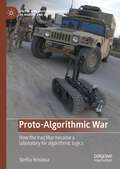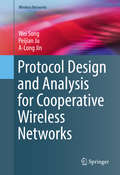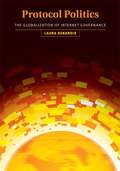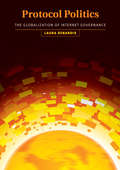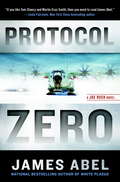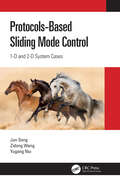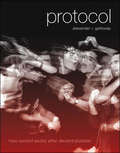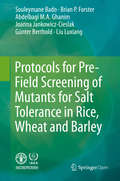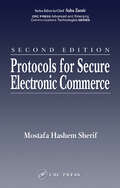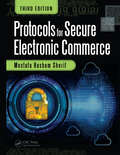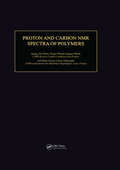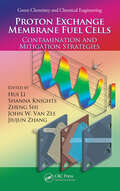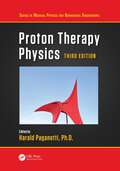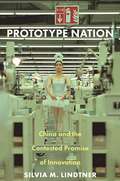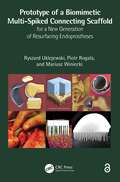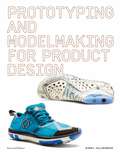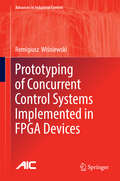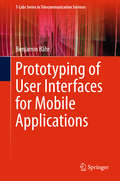- Table View
- List View
Proteomics in Foods
by Fidel Toldrá Leo M. NolletFood proteomics is one of the most dynamic and fast-developing areas in food science. The goal of this book is to be a reference guide on the principles and the current and future potential applications of proteomics in food science and technology. More specifically, the book will discuss recent developments and the expected trends of the near future in food proteomics. The book will be divided into two parts. The first part (7 chapters) will focus on the basic principles for proteomics, e.g., sample preparation, such as extraction and separation techniques, analytical instrumentation currently in use, and available databases for peptide and protein identification. The second part of the book (26 chapters) will focus on applications in foods. It will deal with quality issues related to post-mortem processes in animal foods and quality traits for all foods in general, as well as the identification of bioactive peptides and proteins, which are very important from the nutritional point of view. Furthermore, consumers are now extremely susceptible to food safety issues, and proteomics can provide reassurance with different safety aspects, such as food authenticity, detection of animal species in the food, and identification of food allergens. All of these issues will be covered in this book. It is also worth noting that both editors are internationally recognized experts in the field of food science, and both have edited numerous food science books and handbooks.
Proto-Algorithmic War: How the Iraq War became a laboratory for algorithmic logics (Social and Cultural Studies of Robots and AI)
by Stefka HristovaDuring the Iraq War, American soldiers were sent to both fight an enemy and to recover a “failed state” in pixelated camouflage uniforms, accompanied by robots, and armed with satellite maps and biometric hand-held scanners. The Iraq War, however, was no digital game: massive-scale physical death and destruction counter the vision of a clean replayable war. The military policy of the United States, and not the actual experience of war, has been rooted in the logic of digital, and nascent algorithmic technology. This logic attempted to reduce culture, society, as well as the physical body and environment into visual data that lacks cultural and historical context. This book details the emergence of a nascent algorithmic war culture in the context of the Iraq War (2003-2010) in relation to the data-driven early 20th century British Mandate for Iraq. Through a series of five inquiries into the ways in which the Iraq War attempted to and often failed to see population and territory as digital and further proto-algorithmic entities, it offers an insight into the digitization and further unmanned automaton of war. It does so through a comparative historical framework reaching back to the quantification techniques harnessed during the British Mandate for Iraq (1918-1932) in order to explicate the parallels and complicated the diversions between the numerical logics that have driven both military state-building enterprises.
Protocol Design and Analysis for Cooperative Wireless Networks
by Wei Song Peijian Ju A-Long JinThis book focuses on the design and analysis of protocols for cooperative wireless networks, especially at the medium access control (MAC) layer and for crosslayer design between the MAC layer and the physical layer. It highlights two main points that are often neglected in other books: energy-efficiency and spatial random distribution of wireless devices. Effective methods in stochastic geometry for the design and analysis of wireless networks are also explored. After providing a comprehensive review of existing studies in the literature, the authors point out the challenges that are worth further investigation. Then, they introduce several novel solutions for cooperative wireless network protocols that reduce energy consumption and address spatial random distribution of wireless nodes. For each solution, the book offers a clear system model and problem formulation, details of the proposed cooperative schemes, comprehensive performance analysis, and extensive numerical and simulation results that validate the analysis and examine the performance under various conditions. The last section of this book reveals several potential directions for the research on cooperative wireless networks that deserve future exploration. Researchers, professionals, engineers, and consultants in wireless communication and mobile networks will find this book valuable. It is also helpful for technical staff in mobile network operations, wireless equipment manufacturers, wireless communication standardization bodies, and governmental regulation agencies.
Protocol Politics
by Laura DenardisThe Internet has reached a critical point. The world is running out of Internet addresses. There is a finite supply of approximately 4.3 billion Internet Protocol (IP) addresses--the unique binary numbers required for every exchange of information over the Internet--within the Internet's prevailing technical architecture (IPv4). In the 1990s the Internet standards community identified the potential depletion of these addresses as a crucial design concern and selected a new protocol (IPv6) that would expand the number of Internet addresses exponentially--to 340 undecillion addresses. Despite a decade of predictions about imminent global conversion, IPv6 adoption has barely begun. IPv6 is not backward compatible with IPv4, and the ultimate success of IPv6 depends on a critical mass of IPv6 deployment, even among users who don't need it, or on technical workarounds that could in turn create a new set of concerns. Protocol Politics examines what's at stake politically, economically, and technically in the selection and adoption of a new Internet protocol. Laura DeNardis's key insight is that protocols are political. IPv6 serves as a case study for how protocols more generally are intertwined with socioeconomic and political order. IPv6 intersects with provocative topics including Internet civil liberties, U.S. military objectives, globalization, institutional power struggles, and the promise of global democratic freedoms. DeNardis offers recommendations for Internet standards governance based not only on technical concerns but on principles of openness and transparency and examines the global implications of looming Internet address scarcity versus the slow deployment of the new protocol designed to solve this problem.
Protocol Politics: The Globalization of Internet Governance (Information Revolution and Global Politics)
by Laura DenardisWhat are the global implications of the looming shortage of Internet addresses and the slow deployment of the new IPv6 protocol designed to solve this problem?The Internet has reached a critical point. The world is running out of Internet addresses. There is a finite supply of approximately 4.3 billion Internet Protocol (IP) addresses—the unique binary numbers required for every exchange of information over the Internet—within the Internet's prevailing technical architecture (IPv4). In the 1990s the Internet standards community selected a new protocol (IPv6) that would expand the number of Internet addresses exponentially—to 340 undecillion addresses. Despite a decade of predictions about imminent global conversion, IPv6 adoption has barely begun. Protocol Politics examines what's at stake politically, economically, and technically in the selection and adoption of a new Internet protocol. Laura DeNardis's key insight is that protocols are political. IPv6 intersects with provocative topics including Internet civil liberties, US military objectives, globalization, institutional power struggles, and the promise of global democratic freedoms. DeNardis offers recommendations for Internet standards governance, based not only on technical concerns but on principles of openness and transparency, and examines the global implications of looming Internet address scarcity versus the slow deployment of the new protocol designed to solve this problem.
Protocol Zero
by James AbelMarine doctor and bio-terror expert Joe Rush returns in an electrifying new arctic adventure in which an apocalyptic plague threatens all of humanity ...
Protocol-Based Sliding Mode Control: 1D and 2D System Cases
by Zidong Wang Jun Song Yugang NiuThis book discusses the Sliding Mode Control (SMC) problems of networked control systems (NCSs) under various communication protocols including static/dynamic/periodic event-triggered mechanism, and stochastic communication, Round-Robin, weighted try-once-discard, multiple-packet transmission, and the redundant channel transmission protocol. The super-twisting algorithm and the extended-state-observer-based SMC scheme are described in this book for suppressing chattering. Besides, the SMC designs for two-dimensional (1-D) and two-dimensional (2-D) NCSs are illustrated as well. Features: Captures recent advances of theories, techniques, and applications of networked sliding mode control from an engineering-oriented perspective. Includes new design ideas and optimization techniques of networked sliding mode control theory. Provides advanced tools to apply networked sliding mode control techniques in the practical applications. Discusses some new tools to the engineering applications while dealing with the model uncertainties and external disturbances. This book aims at Researchers and professionals in Control Systems, Computer Networks, Internet of Things, and Communication Systems.
Protocol: How Control Exists after Decentralization (Leonardo)
by Alexander R. GallowayHow Control Exists after DecentralizationIs the Internet a vast arena of unrestricted communication and freely exchanged information or a regulated, highly structured virtual bureaucracy? In Protocol, Alexander Galloway argues that the founding principle of the Net is control, not freedom, and that the controlling power lies in the technical protocols that make network connections (and disconnections) possible. He does this by treating the computer as a textual medium that is based on a technological language, code. Code, he argues, can be subject to the same kind of cultural and literary analysis as any natural language; computer languages have their own syntax, grammar, communities, and cultures. Instead of relying on established theoretical approaches, Galloway finds a new way to write about digital media, drawing on his backgrounds in computer programming and critical theory. "Discipline-hopping is a necessity when it comes to complicated socio-technical topics like protocol," he writes in the preface. Galloway begins by examining the types of protocols that exist, including TCP/IP, DNS, and HTML. He then looks at examples of resistance and subversion—hackers, viruses, cyberfeminism, Internet art—which he views as emblematic of the larger transformations now taking place within digital culture. Written for a nontechnical audience, Protocol serves as a necessary counterpoint to the wildly utopian visions of the Net that were so widespread in earlier days.
Protocols for Macroalgae Research
by Bénédicte Charrier Thomas Wichard C.R.K. ReddyThis book presents a wide range of tested and proven protocols relevant to a number of fields within biotechnology used in laboratory experiments in everyday phycological (seaweed) research.
Protocols for Pre-Field Screening of Mutants for Salt Tolerance in Rice, Wheat and Barley
by Souleymane Bado Brian P. Forster Abdelbagi M. A. Ghanim Joanna Jankowicz-Cieslak Günter Berthold Liu LuxiangThis book offers effective, low-costand user-friendly protocols for the pre-field selection of salt-tolerant mutants in cereal crops. It presents simple methods for measuring soil salinity, includingsoil sampling and the analysis of water-soluble salts, and describes adetailed, but simple, screening test for salt tolerance in rice, wheat andbarley seedlings, which uses hydroponics. The protocols are devised for use byplant breeders and can be easily accommodated into breeding practice.
Protocols for Secure Electronic Commerce (Advanced & Emerging Communications Technologies)
by Mostafa Hashem SherifThe continued growth of e-commerce mandates the emergence of new technical standards and methods that will securely integrate online activities with pre-existing infrastructures, laws and processes. Protocols for Secure Electronic Commerce, Second Edition addresses the security portion of this challenge. It is a full compendium of the protocols for securing online commerce and payments, serving as an invaluable resource for students and professionals in the fields of computer science and engineering, IT security, and financial and banking technology. The initial sections provide a broad overview of electronic commerce, money, payment systems, and business-to-business commerce, followed by an examination of well-known protocols (SSL, TLS, WTLS, and SET). The book also explores encryption algorithms and methods, EDI, micropayment, and multiple aspects of digital money. Like its predecessor, this edition is a general analysis that provides many references to more technical resources. It delivers extensive revisions of previous chapters, along with new chapters on electronic commerce in society, new e-commerce systems, and the security of integrated circuit cards.
Protocols for Secure Electronic Commerce (Advanced And Emerging Communications Technologies Ser.)
by Mostafa Hashem SherifProtocols for Secure Electronic Commerce, Third Edition presents a compendium of protocols for securing electronic commerce, or e-commerce, in consumer- and business-to-business applications. Attending to a variety of electronic payment systems currently in use around the globe, this edition: <Li>Updates all chapters to reflect the latest technical advances and developments in areas such as mobile commerce <Li>Adds a new chapter on Bitcoin and other cryptocurrencies that did not exist at the time of the previous edition's publication <Li>Increases the coverage of PayPal in accordance with PayPal’s amplified role for consumers and businesses <Li>Expands the discussion of bank cards, dedicating a full chapter to magnetic stripe cards and a full chapter to chip-and-PIN technology <P><P>Protocols for Secure Electronic Commerce, Third Edition offers a state-of-the-art overview of best practices for the security of e-commerce, complete with end-of-chapter review questions and an extensive bibliography of specialized references. A Solutions Manual and PowerPoint slides are available with qualifying course adoption.
Proton & Carbon NMR Spectra of Polymers
by Quang Tho Pham Roger Petiaud Marie-France Llauro-Darricades Hugues WatonProton and Carbon NMR Spectra of Polymers is an updated, consolidated volume featuring the spectra published in three previous volumes, plus 150 newly derived spectra. It contains 458 NMR spectra with associated analytical notes covering acrylics, amides, dienes, ethers, olefins, siloxins, styrenes and derivatives, urethanes, vinyls, vinylidenes, and others. The spectra obtained are either 1H or 13C; extended bibliographic references are attached. Each entry provides details of the chemical structure of the analyzed sample, in addition to analytical conditions including nucleus, frequency, spectrometer, detection technique, solvent, temperature, reference, lock and, where appropriate, flip angle. The wealth of information contained in this single volume make Proton and Carbon NMR Spectra of Polymers an essential acquisition for all academic, industrial research, and analytical laboratories and libraries involved with polymer chemistry.
Proton Exchange Membrane Fuel Cells (ISSN)
by Zhigang QiWritten by an industry-leading scientist, Proton Exchange Membrane Fuel Cells explains the theoretical foundations of PEM fuel cells in relation to practical design and operation to not only help beginners grasp the essentials, but also guide industry professionals in tackling technical challenges. Useful to scientists, researchers, students, academics, and practicing engineers, the book covers the fundamentals, materials, components, modules, system architecture, applications, and current developmental status; offers real-world examples; and provides insight into advancing this sustainable clean technology.
Proton Exchange Membrane Fuel Cells Modeling
by Benjamin Blunier Fengge Gao Abdellatif MiraouiThe fuel cell is a potential candidate for energy storage and conversion in our future energy mix. It is able to directly convert the chemical energy stored in fuel (e.g. hydrogen) into electricity, without undergoing different intermediary conversion steps. In the field of mobile and stationary applications, it is considered to be one of the future energy solutions. Among the different fuel cell types, the proton exchange membrane (PEM) fuel cell has shown great potential in mobile applications, due to its low operating temperature, solid-state electrolyte and compactness. This book presents a detailed state of art of PEM fuel cell modeling, with very detailed physical phenomena equations in different physical domains. Examples and a fully coupled multi-physical 1.2 kW PEMFC model are given help the reader better understand how to use the equations.
Proton Exchange Membrane Fuel Cells: Contamination and Mitigation Strategies
by Jiujun Zhang Hui Li Shanna Knights Zheng Shi John W. Van ZeeLarge-scale commercialization of proton exchange membrane fuel cell (PEMFC) technology has been hindered by issues of reliability, durability, and cost, which are all related to the degradation of fuel cell performance. This degradation often has root causes in contamination from fuel, air streams, or system components. With contributions from inte
Proton Exchange Membrane Fuel Cells: Electrochemical Methods and Computational Fluid Dynamics
by Inamuddin Mohd Imran Ahamed Omid MoradiPROTON EXCHANGE MEMBRANE FUEL CELLS Edited by one of the most well-respected and prolific engineers in the world and his team, this book provides a comprehensive overview of hydrogen production, conversion, and storage, offering the scientific literature a comprehensive coverage of this important fuel. Proton exchange membrane fuel cells (PEMFCs) are among the most anticipated stationary clean energy devices in renewable and alternative energy. Despite the appreciable improvement in their cost and durability, which are the two major commercialization barriers, their availability has not matched demand. This is mainly due to the use of expensive metal-catalyst, less durable membranes, and poor insight into the ongoing phenomena inside proton exchange membrane fuel cells. Efforts are being made to optimize the use of precious metals as catalyst layers or find alternatives that can be durable for more than 5000 hours. Computational models are also being developed and studied to get an insight into the shortcomings and provide solutions. The announcement by various companies that they will be producing proton exchange membrane fuel cells-based cars by 2025 has accelerated the current research on proton exchange membrane fuel cells. The breakthrough is urgently needed. The membranes, catalysts, polymer electrolytes, and especially the understanding of diffusion layers, need thorough revision and improvement to achieve the target. This exciting breakthrough volume explores these challenges and offers solutions for the industry. Whether for the student, veteran engineer, new hire, or other industry professionals, this is a must-have for any library.
Proton Exchange Membrane Fuel Cells: Materials Properties and Performance (Green Chemistry and Chemical Engineering)
by Jiujun Zhang David P. Wilkinson Jeffrey Fergus Rob HuiA Detailed, Up-to-Date Treatment of Key Developments in PEMFC MaterialsThe potential to revolutionize the way we power our worldBecause of its lower temperature and special polymer electrolyte membrane, the proton exchange membrane fuel cell (PEMFC) is well-suited for transportation, portable, and micro fuel cell applications. But the performance o
Proton Therapy Physics (Series in Medical Physics and Biomedical Engineering)
by Harald PaganettiExpanding on the highly successful previous two editions, this third edition of Proton Therapy Physics has been updated throughout and includes several new chapters on “Adaptive Proton Therapy,” "Imaging for Planning,” “Flash Proton Therapy,” and “Outcome Modeling for Patient Selection.” Suitable for both newcomers in medical physics and more seasoned specialists in radiation oncology, this book provides an in‑depth overview of the physics of this radiation therapy modality, eliminating the need to dig through information scattered across medical physics literature.After tracing the history of proton therapy, this book explores the atomic and nuclear physics background necessary for understanding proton interactions with tissue. The text then covers dosimetry, including beam delivery, shielding aspects, computer simulations, detector systems, and measuring techniques for reference dosimetry. Important for daily operations, acceptance testing, commissioning, quality assurance, and monitor unit calibrations are outlined. This book moves on to discussions of imaging for planning and image guidance as well as treatment monitoring. Aspects of treatment planning for single‑ and multiple‑field uniform doses, dose calculation concepts and algorithms, and precision and uncertainties for nonmoving and moving targets are outlined. Finally, the biological implications of using protons from a physics perspective as well as outcome modeling are discussed.This book is an ideal practical guide for physicians, dosimetrists, radiation therapists, and physicists who already have some experience in radiation oncology. It is also an invaluable reference for graduate students in medical physics programs, physicians in their last year of medical school or residency, and those considering a career in medical physics.Key Features:• Updated with the latest technologies and methods in the field, covering all delivery methods of proton therapy, including beam scanning and passive scattering.• Discusses clinical aspects, such as treatment planning and quality assurance.• Offers insight into the past, present, and future of proton therapy from a physics perspective.Dr. Harald Paganetti is a distinguished figure in the field of radiation oncology, serving as Professor of Radiation Oncology at Harvard Medical School and Director of Physics Research at Massachusetts General Hospital. He earned his PhD in experimental nuclear physics from the Rheinische‑Friedrich‑Wilhelms University in Bonn, Germany, in 1992.
Prototype Nation: China and the Contested Promise of Innovation (Princeton Studies in Culture and Technology #29)
by Silvia M. LindtnerA vivid look at China’s shifting place in the global political economy of technology production How did China’s mass manufacturing and “copycat” production become transformed, in the global tech imagination, from something holding the nation back to one of its key assets? Prototype Nation offers a rich transnational analysis of how the promise of democratized innovation and entrepreneurial life has shaped China’s governance and global image. With historical precision and ethnographic detail, Silvia Lindtner reveals how a growing distrust in Western models of progress and development, including Silicon Valley and the tech industry after the financial crisis of 2007–8, shaped the rise of the global maker movement and the vision of China as a “new frontier” of innovation.Lindtner’s investigations draw on more than a decade of research in experimental work spaces—makerspaces, coworking spaces, innovation hubs, hackathons, and startup weekends—in China, the United States, Africa, Europe, Taiwan, and Singapore, as well as in key sites of technology investment and industrial production—tech incubators, corporate offices, and factories. She examines how the ideals of the maker movement, to intervene in social and economic structures, served the technopolitical project of prototyping a “new” optimistic, assertive, and global China. In doing so, Lindtner demonstrates that entrepreneurial living influences governance, education, policy, investment, and urban redesign in ways that normalize the persistence of sexism, racism, colonialism, and labor exploitation.Prototype Nation shows that by attending to the bodies and sites that nurture entrepreneurial life, technology can be extricated from the seemingly endless cycle of promise and violence.Cover image: Courtesy of Cao Fei, Vitamin Creative Space and Sprüth Magers
Prototype of a Biomimetic Multi-Spiked Connecting Scaffold for a New Generation of Resurfacing Endoprostheses
by Ryszard Uklejewski Piotr Rogala Mariusz WinieckiThe monograph comprehensively presents the research on the prototype of the biomimetic Multi-Spiked Connecting Scaffold (MSC-Scaffold) for cementless fixation of the components of a new generation of resurfacing arthroplasty (RA) endoprostheses. This research, carried out by a bioengineering-surgical team from three Polish universities, includes bioengineering design, rapid prototyping, manufacturing in selective laser melting, functionalization, surface modification, numerical studies, experimental in vitro studies, and pilot surgical experiments in an animal model. Features: Presents the prototype of the multi-spiked connecting scaffold for a new generation of resurfacing endoprostheses of the knee and the hip Explains this prototype scaffold as the first worldwide design of the biomimetic fixation of components of diarthrodial joints resurfacing endoprostheses Insights into the entire process of bioengineering design and research on this novel way of resurfacing endoprostheses fixation Reviews main results of the scaffold prototyping and SLM manufacturing, structural and osteoconductive functionalization, and surface modification Reports experimental and numerical investigations of mechanical behavior of the scaffold-bone system, cell culture studies, and pilot surgical experiments in animal models This book is aimed at professionals and graduate students in biomedical engineering, biomaterials engineering, and bone & joint surgery. The Open Access version of this book, available at http://www.taylorfrancis.com, has been made available under a Creative Commons [Attribution-Non Commercial-No Derivatives (CC-BY-NC-ND)] 4.0 license.
Prototyping and Modelmaking for Product Design: Second Edition
by Bjarki HallgrimssonNow in its second edition, Prototyping and Modelmaking for Product Design, by practising product development consultant Bjarki Hallgrimsson, is essential reading for both students and design professionals.Prototyping and ModelMaking for Product Design goes behind the scenes to illustrates how prototypes are used to help designers understand problems better, explore more imaginative solutions, investigate human interaction more fully and test functionality so as to de-risk the design process. Following an introduction on the purpose of prototyping, specific materials, tools and techniques are examined in detail, with step-by-step tutorials and industry examples of real and successful products illustrating how prototypes are used to help solve design problems. Workflow is also discussed, using a mixture of hands-on and digital tools.This new edition includes case studies representing technological developments such as prototyping user experience and interactive electronic products, as well as a new expanded section on digital modelmaking tools, including 3D printing and laser cutting.The first chapters of the book explain why prototyping is so important to the design process. The many uses of prototyping will be shown in the context of several comprehensive projects by some of the world's leading design firms.The second part is an introduction to the typical materials used by designers in their prototyping efforts and how to work with them. In all cases, the approach is to use digital and manual tools in a complementary and effective fashion. Tutorials were specifically developed that underline the back and forth of digital and manual ways of working. The emphasis is on the kinds of construction that can be done by the designers themselves. Health and safety is stressed in terms of personal responsibility and awareness.Topics covered include:Definition of prototyping and modelmakingPrototyping as a form of problem solvingModelmakingPhysical and digital prototypesBuidling by hand and using digital technologies
Prototyping and Modelmaking for Product Design: Second Edition
by Bjarki HallgrimssonNow in its second edition, Prototyping and Modelmaking for Product Design, by practising product development consultant Bjarki Hallgrimsson, is essential reading for both students and design professionals.Prototyping and ModelMaking for Product Design goes behind the scenes to illustrates how prototypes are used to help designers understand problems better, explore more imaginative solutions, investigate human interaction more fully and test functionality so as to de-risk the design process. Following an introduction on the purpose of prototyping, specific materials, tools and techniques are examined in detail, with step-by-step tutorials and industry examples of real and successful products illustrating how prototypes are used to help solve design problems. Workflow is also discussed, using a mixture of hands-on and digital tools.This new edition includes case studies representing technological developments such as prototyping user experience and interactive electronic products, as well as a new expanded section on digital modelmaking tools, including 3D printing and laser cutting.The first chapters of the book explain why prototyping is so important to the design process. The many uses of prototyping will be shown in the context of several comprehensive projects by some of the world's leading design firms.The second part is an introduction to the typical materials used by designers in their prototyping efforts and how to work with them. In all cases, the approach is to use digital and manual tools in a complementary and effective fashion. Tutorials were specifically developed that underline the back and forth of digital and manual ways of working. The emphasis is on the kinds of construction that can be done by the designers themselves. Health and safety is stressed in terms of personal responsibility and awareness.Topics covered include:Definition of prototyping and modelmakingPrototyping as a form of problem solvingModelmakingPhysical and digital prototypesBuidling by hand and using digital technologies
Prototyping of Concurrent Control Systems Implemented in FPGA Devices
by Remigiusz WiśniewskiThis book focuses on prototyping aspects of concurrent control systems and their further implementation and partial reconfiguration in programmable devices. Further, it lays out a full prototyping flow for concurrent control systems. Based on a given primary specification, a system is described with an interpreted Petri net, which naturally reflects the concurrent and sequential relationships of the design. The book shows that, apart from the traditional option of static configuration of the entire system, the latest programmable devices (especially FPGAs) offer far more sophistication. Partial reconfiguration allows selected parts of the system to be replaced without having to reprogram the entire structure of the device. Approaches to dynamic and static partial reconfiguration of concurrent control systems are presented and described in detail. The theoretical work is illustrated by examples drawn from various applications, with a milling machine and a traffic-light controller highlighted as representative interpreted Petri nets. Given the ubiquity of concurrent control systems in a huge variety of technological areas including transportation, medicine, artificial intelligence, manufacturing, security and safety and planetary exploration, the innovative software and hardware design methods described here will be of considerable interest to control engineers and systems and circuits researchers in many areas of industry and academia.
Prototyping of User Interfaces for Mobile Applications (T-Labs Series in Telecommunication Services)
by Benjamin BährThis book investigates processes for the prototyping of user interfaces for mobile apps, and describes the development of new concepts and tools that can improve the prototype driven app development in the early stages. It presents the development and evaluation of a new requirements catalogue for prototyping mobile app tools that identifies the most important criteria such tools should meet at different prototype-development stages. This catalogue is not just a good point of orientation for designing new prototyping approaches, but also provides a set of metrics for a comparing the performance of alternative prototyping tools. In addition, the book discusses the development of Blended Prototyping, a new approach for prototyping user interfaces for mobile applications in the early and middle development stages, and presents the results of an evaluation of its performance, showing that it provides a tool for teamwork-oriented, creative prototyping of mobile apps in the early design stages.

